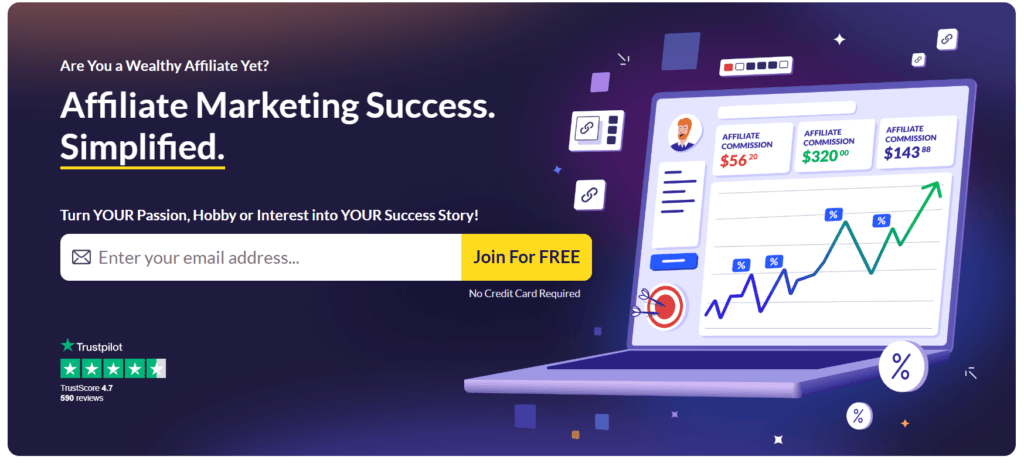Is Affiliate Marketing A Scam?
Introduction to Affiliate Marketing: Understanding the Basics
Affiliate marketing is like being the middleman in the digital world, but in a cool way. You’ve probably seen it in action without even realizing it. It’s when someone recommends a product or service online, and if you click through their link and buy something, they get a little thank you commission from the seller. It’s a win-win-win situation: the seller gets a sale, the buyer discovers a cool product, and the affiliate earns a little extra for making the introduction.
Getting started is pretty straightforward. First, you find a product you dig and would genuinely recommend. This could be anything from a new tech gadget, a skincare product that works wonders, or an online course that blew your mind. Then, you join the affiliate program for that product. These programs are usually free to join; they’re the seller’s way of saying, “Hey, help me spread the word, and I’ll share the profits.”
Once you’re in, you’ll get a unique affiliate link. This link is your key to earning commissions. You share this link on your blog, social media, YouTube channel, or wherever you have an audience that trusts your recommendations (To learn more about the how-do-I-do-this, click the link at the bottom of the page). When someone clicks on your link and makes a purchase, you get a piece of the pie.
The beauty of affiliate marketing is its simplicity and flexibility. You don’t have to create a product, deal with customer service, or ship anything. Your main focus is on sharing your genuine recommendations in creative and engaging ways. Whether you’re a blogger, an Instagram influencer, or just someone with a lot of Facebook friends, you can dip your toes into the affiliate marketing pool.


The Legitimate Side of Affiliate Marketing: Success Stories and Benefits
When I first dipped my toes into the world of affiliate marketing, I’ll admit, I was skeptical. The internet is awash with promises of easy money and overnight success, and we’ve all learned to take those with a grain of salt. But as I navigated through the initial learning curve, I began to uncover the legitimate side of affiliate marketing, and let me tell you, it’s not just real—it’s remarkably beneficial.
1. Flexibility and Freedom
One of the first things that struck me about affiliate marketing was the incredible flexibility it offers. Here I am, working from wherever I want, whenever I want. Whether it’s the comfort of my home, a cozy cafe downtown, or even while traveling, my work follows me. This kind of freedom is rare in traditional jobs, and it’s been a game-changer for my work-life balance.
2. Low Start-Up Costs
Starting a business typically involves significant upfront investment, but affiliate marketing turned out to be an exception. Without the need for a physical storefront or an extensive inventory, the barriers to entry were surprisingly low. All I really needed was a laptop, an internet connection, and a bit of know-how to get started. This accessibility is a huge benefit for those of us not willing or able to invest large sums of money upfront.
3. Passive Income Potential
The allure of earning money while you sleep is a big part of what draws people to affiliate marketing, and it’s not just a dream. Once you’ve set up your affiliate links and content, they can continue to generate income with minimal upkeep. Of course, it takes effort and dedication to get to that point, but the potential for passive income is real and incredibly rewarding.
4. Vast Selection of Products and Services
Whatever your niche or passion, there’s almost certainly an affiliate program that fits. From books and beauty products to software and services, the variety is astounding. This diversity allows me to choose products I genuinely believe in and would recommend anyway, which makes my promotional efforts feel more authentic and less like a sales pitch.
5. Learning and Growth
Embarking on this journey has been a profound learning experience. From SEO and content marketing to social media strategies, I’ve gained a wealth of knowledge that’s not only applicable to affiliate marketing but to digital marketing as a whole. This continuous learning keeps me engaged and ensures that my marketing skills stay sharp and relevant.
6. Scalability
Another aspect of affiliate marketing that excites me is its scalability. As I refine my strategies and grow my audience, my affiliate income has the potential to increase as well. Unlike a traditional job with a fixed salary, the sky’s the limit here. It’s empowering to know that my income is directly tied to my effort and creativity.
Affiliate marketing has far exceeded my initial expectations. It’s offered me freedom, flexibility, and financial opportunities that I hadn’t found elsewhere. While it’s not a get-rich-quick scheme and requires real work and dedication, the benefits are tangible and, for me, well worth the effort. Whether you’re looking for a side hustle or a full-time career, the world of affiliate marketing is worth exploring.
Common Misconceptions and Myths About Affiliate Marketing
As an affiliate marketer, I’ve encountered numerous misconceptions and myths about the industry that often paint an unrealistic picture of what it’s really about. Through my experiences, I aim to shed light on these misunderstandings to provide a clearer perspective.
One prevalent myth is that affiliate marketing is a quick and easy way to make money online. Many people believe that you can simply set up a website, post a few affiliate links, and watch the money roll in. However, this couldn’t be further from the truth. Successful affiliate marketing requires a strategic approach, including thorough market research, content creation, and continuous engagement with your audience. It takes time, effort, and patience to build a platform that genuinely converts visitors into sales.
Another common misconception is that affiliate marketing is no longer relevant or profitable due to market saturation. While it’s true that the digital landscape is competitive, there’s still plenty of room for growth and success. The key is to find a niche market or offer unique insights and value that set you apart from the competition. With the right approach, affiliate marketing can be an incredibly lucrative venture.
Many also believe that you need a massive following to be successful in affiliate marketing. While having a large audience can certainly help, it’s not a prerequisite for success. What’s more important is having a targeted and engaged audience. Even with a smaller following, if your audience trusts your recommendations and finds value in your content, you can achieve significant affiliate sales.
Lastly, there’s a myth that affiliate marketing is somehow unethical or involves tricking people into buying products. Ethical affiliate marketing is about creating genuine, value-added content that helps your audience make informed decisions. It’s about recommending products or services you truly believe in and would use yourself. Transparency and honesty are key to building trust and a loyal following.
What you will find is that affiliate marketing is a dynamic and viable online business model that, like any other, requires hard work, dedication, and a strategic approach. By debunking these myths, I hope to encourage a more realistic understanding of what affiliate marketing entails and the potential it holds for those willing to invest the effort.


Recognizing Scams in Affiliate Marketing: Red Flags and Warning Signs
Recognizing scams in affiliate marketing is crucial to safeguard both your finances and reputation. As an affiliate marketer, I’ve learned to navigate through enticing offers to identify genuine opportunities from deceptive ones. Here are some red flags and warning signs I’ve come to recognize over time.
Unrealistic Promises: The first red flag that often catches my eye is the promise of high earnings with minimal effort. Genuine affiliate marketing requires time, effort, and strategy. Any program that promises quick riches without a solid explanation of how these earnings will be achieved is often too good to be true.
Lack of Transparency: Transparency is key in any business, especially in affiliate marketing. Programs that are vague about their products, services, or compensation plans raise immediate concerns. I always look for clear, detailed information about what I’m promoting and how I’ll be compensated. A legitimate program will have no issues providing this information.
Upfront Fees: Being asked to pay to join an affiliate program is a significant warning sign. While there are legitimate costs associated with running any business, paying for the privilege to sell a company’s products is unusual. Legitimate affiliate programs are free to join; they make money when you make sales, not from sign-up fees.
Poor Reviews and Reputation: Before joining any program, I research its reputation online. Testimonials, reviews, and discussions on forums and social media provide invaluable insights. A pattern of complaints or issues should not be ignored. Remember, a company’s reputation can directly affect your own.
Overly Complicated Compensation Plans: If I can’t understand how I’m going to be paid after reading through the compensation plan, it’s a red flag. Complex schemes that make it difficult to earn commissions or require an unreasonable amount of sales to qualify for payments are often designed to benefit the company more than the affiliate.
Pressure Tactics: Legitimate programs allow you to take your time to decide if you want to join. If I’m pressured to sign up quickly, often under the guise of a “limited-time offer,” it’s a tactic to make me commit without proper consideration.
It all comes down to vigilance, research, and intuition. By paying attention to these red flags and warning signs, I’ve been able to avoid scams and focus on building a successful, ethical affiliate marketing business.
Legal and Ethical Considerations in Affiliate Marketing
In the world of affiliate marketing, where I find myself deeply involved, navigating the maze of legal and ethical considerations is both challenging and essential. As an affiliate marketer, my primary role involves promoting products or services and earning commissions for sales or leads generated through my efforts. However, this seemingly straightforward process is underpinned by a complex web of legalities and moral obligations.
First and foremost, transparency is key. I am legally required to disclose my affiliate relationships to my audience, ensuring they are aware that I may receive compensation for the products or services I recommend. This disclosure isn’t just a legal formality; it’s an ethical commitment to honesty and integrity, fostering trust with my followers.
Furthermore, compliance with advertising laws is non-negotiable. I must ensure that my promotions do not mislead or deceive consumers. This means avoiding exaggerated claims and clearly representing the products or services. The Federal Trade Commission (FTC) in the United States, for example, sets forth guidelines that I meticulously adhere to, ensuring my marketing practices are not only legal but also fair and transparent.
Additionally, respecting intellectual property rights is a critical legal and ethical consideration. I must ensure that the content I create or use in my promotions does not infringe on others’ copyrights or trademarks. This respect for intellectual property not only helps avoid legal repercussions but also fosters a culture of creativity and innovation in the marketing ecosystem.
In essence, as an affiliate marketer, I strive to balance my ambitions with a deep sense of responsibility. Navigating the legal and ethical landscape requires diligence, integrity, and an unwavering commitment to fairness and transparency. By adhering to these principles, I not only protect my reputation and comply with the law but also contribute to a more trustworthy and ethical marketing community.


How to Safely Navigate the Affiliate Marketing Industry
As someone deeply immersed in the affiliate marketing industry, I’ve learned that navigating this space safely requires a blend of ethical practices, continuous learning, and strategic partnerships. First and foremost, transparency is key. I always disclose my affiliate relationships to my audience, ensuring they understand that I may earn a commission on products or services I recommend. This honesty not only complies with legal requirements but also builds trust with my followers.
Understanding and complying with regulations is also crucial. I stay updated on the guidelines set by regulatory bodies, such as the Federal Trade Commission in the United States, to ensure my marketing practices are up to standard. This includes clear and conspicuous disclosures and avoiding misleading claims.
Another vital aspect is choosing the right partners. I meticulously research merchants and affiliate programs before joining to ensure they align with my values and the interests of my audience. This vetting process includes evaluating the product or service quality, the reputation of the company, and the terms of the affiliate program.
Finally, education is a continuous process in affiliate marketing. I constantly seek to improve my knowledge on digital marketing trends, SEO strategies, and content creation to enhance my campaigns’ effectiveness and engage my audience meaningfully.
By adhering to these principles, I’ve been able to navigate the affiliate marketing industry safely and successfully, creating a sustainable income stream while maintaining integrity and fostering trust with my audience.
Separating Fact from Fiction in Affiliate Marketing
In navigating the complex landscape of affiliate marketing, distinguishing fact from fiction has been a critical part of my journey. Initially, I was swayed by promises of effortless earnings and overnight success, only to realize the need for a more nuanced understanding. I’ve learned that affiliate marketing, contrary to some claims, is not a quick path to wealth. Success requires significant effort, strategic planning, and patience. It involves understanding the products or services you’re promoting and building a genuine connection with your audience.
My experience has debunked the myth that affiliate marketing is purely passive income; it demands continuous content creation, market research, and audience engagement to stay relevant and profitable. Moreover, transparency and ethical practices are paramount. Misleading your audience for short-term gains can tarnish your reputation and erode trust. By embracing these truths, I’ve found affiliate marketing to be a rewarding avenue for sustainable income, provided one approaches it with honesty, diligence, and a commitment to delivering value.

We just touched the surface in exploring affiliate marketing, debunking myths and highlighting its legitimacy, flexibility, low start-up costs, and potential for passive income. It emphasizes due diligence in identifying scams, advocating for ethical practices and continuous learning. Wealthy Affiliate is recommended as a prime starting point for those interested in affiliate marketing, offering a comprehensive platform for learning and growth. Signing up for a free account with Wealthy Affiliate is encouraged, positioning it as an ideal launchpad for anyone looking to embark on an affiliate marketing journey.
Sign Up For A Free Account Today! No Credit Card Required!









